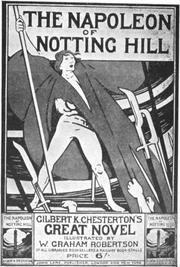In the distant future of 1984 (lol), things are pretty much the same as they were in 1904. Men still wear their topcoats, and politics has become so humdrum and bureaucratic that the king is chosen at random, because he might as well be. Chesterton's vision of the future is a wry takedown of the predictors and prognosticators popular in his time who "took something or other that was certainly going on in their time, and then said it would go on more and more until something extraordinary happened." But it also anticipates the theory of Francis Fukuyama's The End of History, which imagines the universal acceptance of liberal government and the end of nationalist squabbling. That sounds nice, maybe, but one of the most provocative ideas in The Napoleon of Notting Hill is that there's something to be said for nationalist squabbles.
The stability of this England is upended when Auberon Quin, one of those career bureaucrats, is chosen as king. Quin uses his new position as an excuse to inject humor into the drab English system of government, and decrees that several London neighborhoods--Notting Hill, Bayswater, South, North, and West Kensington--must build city walls and operate as medieval city-states, with halberdiers, banners, and Arthurian pomp. No one appreciates the joke, but they begrudgingly go along with the joke.
Years later, the provost of Notting Hill, Adam Wayne, begs for an audience with King Auberon. The provosts of Bayswater and South Kensington, you see, want to demolish Notting Hill's Pump Street, and its dingy handful of shops, to build a highway. Wayne is younger than the King, and the other provosts, and in fact he has grown up in the system which the King imposed as a joke. Which means he doesn't see it as a joke. He is a living, breathing medieval man, who speaks earnestly in the Arthurian manner which the King speaks ironically, and he believes in the sanctity of Notting Hill. What follows is a protracted "war" in which the forces of Notting Hill heroically withstand the onslaughts of the halberdiers of the other neighborhoods, and wins its own sovereignty.
Some of Chesterton's objectives in this novel are political. He looked at the world of 1904 and saw the massive British Empire systematically squashing smaller states. Notting Hill, like Nicaragua (whose king makes a brief and baffling appearance in the beginning of the novel), stakes its right to its own sovereignty on the depth of attachment of its own citizens. Patriotism, for Chesterton, matters because it is subjective, and subjective feeling matters more than the unfeeling interests of the state. Martin Gardner, in the foreword, argues that we are meant to reject Wayne's assertion that "[t]here were never any just wars but the religious wars," but I think that's Chesterton's point precisely. Chesterton, of course, died in 1936, just as the dangers of sentimental patriotism were really starting to become apparent.
On another level, The Napoleon of Notting Hill, like The Man Who Was Thursday, political intrigue transforms into religious allegory. In a final meeting, Quin and Wayne consider themselves as representations of God and man. God, like Quin, may have made the world in jest and scorn, but man endows it with an inviolate value:
"...Suppose I do not laugh back at you, do not blaspheme you, do not curse you. But suppose, standing up straight up under the sky, with every power of my being, I thank you for the fools' paradise you have made. Suppose I praise you, with a literal pain of ecstasy, for the jest that has brought me so terrible a joy. If we have taken the child's games, and given them the seriousness of a Crusade, if we have drenched your grotesque Dutch garden with the blood of martyrs, we have turned a nursery into a temple. I ask you, in the name of Heaven, who wins?"
This doesn't work as well as it does in Thursday, I think, where seems both natural and remarkably profound. In many ways Notting Hill seems like Chesterton feeling out the mode which he perfects in Thursday: he mines the mundanity of politics for its absurdity and humor, and finds meaning in the absurd. And unlike Thursday, Chesterton isn't really able to graft this mix of comedy and profundity to a workable plot--the battle scenes, which ought to be funny, are really mostly a slog. Maybe a Londoner, who knows these places and for whom the absurdity of treating them like medieval Florence or Brittany or something would better land, might have gotten more out of it.


No comments:
Post a Comment